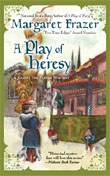CHAPTER 16
The next day began gray, with low clouds and scudding rain, well suited to Joliffe’s dark humour and, he did not doubt, to a number of other people’s. It had been bad enough, seeing him hanging there, dead. Today he would have to look at his body again and did not care even for the thought of that...
By late medieval times in England, the coroner (properly “crowner”) had become the official first-responder where a doubtful and/or unexpected death had occurred. It was his duty to determine whether the death were accidental and therefore of no interest to the king, or due to a crime and therefore potentially bringing profit to the king through the seizure of property of the guilty.
Lacking an established police force (and no quick way to bring them on the scene anyway), it was the duty of any citizens present or in the vicinity of a crime to apprehend the perpetrator or else, if he was fleeing, to raise the “hue and cry”. The hue and cry required, by law, that everyone in hearing set out in hot pursuit and, if possible, lay hold on the wrong-doer and afterward keep him secure until the crowner could be summoned to take over the official duty of investigating the crime.
The coroner’s business, when he arrived, was to gather as many facts about the death as possible, both by questioning witnesses and studying the body and the scene of the crime (or whether the death was accidental death), as detailed in The Laws and Customs of England by Henry de Bracton (as translated by Samuel Thorne and published by the Harvard University Press, 1968) where the coroner’s duties are given at length, beginning with, “[Wherever men are found dead] it is the business of the coroners to make diligent inquiry with respect to such, and if they have been slain, as to the slayers, when he is unknown, and therefore, as soon as they have their order … they ought to go to those who have been slain or wounded or drowned or have met untimely deaths … [and] at once and without delay to the place where the dead man has been found, and on their arrival there to order four, five or six of the neigbouring vills to come before them at once and by their oath hold an inquest … on the slain man…” The coroner is to ask where he was slain and under what circumstances, and who was present when it happened, and which of them “were guilty as principals and which as accessories, counsellors or instigators.” Whoever is found guilty by inquest is to be arrested at once “if they are present or can be found elsewhere, and handed over to the sheriff and clapped in gaol.”
On the other hand, if the victim is found in the fields or woods, it is to be learned “whether the dead man was slain where he was found or elsewhere. If he was not slain there, as may be ascertained by presumptions, often, if he has wounds, by the flow of blood, the traces left by the malefactors are to be promptly and immediately discovered and followed,” whether of cart, horses’ hoofmarks, “the footprints of men or in some other way, according as that may best and most efficiently be done.” And so on.
In The Medieval Coroner by R.F. Hunnisett goes into great detail regarding all the duties of medieval coroners and other matters concerning them, but here, for now, it’s murder that most occupies us, yes?
– Margaret
Follow the virtual bookclub for A Play of Heresy on Facebook and Twitter.

















December 26th, 2011 - 11:30 pm
There is a burglar alarm company in my area called (I kid you not) Hue and Cry. Every time I see one of their vans around town it makes me giggle.
December 27th, 2011 - 10:09 am
Love it!